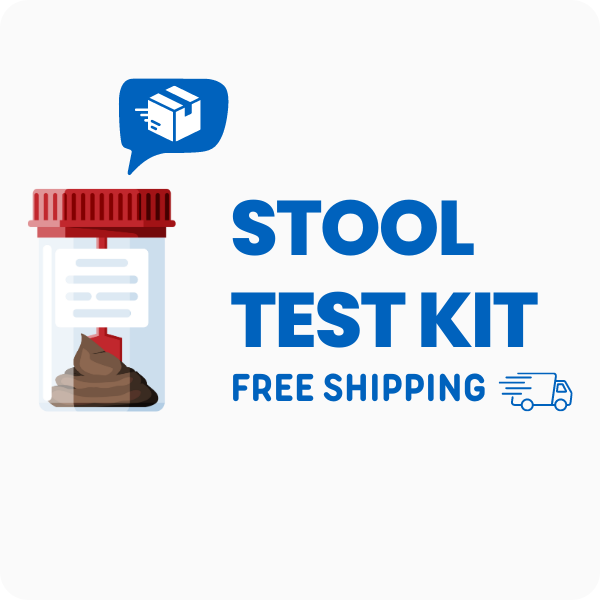Ordering the H. Pylori Stool Antigen Test
Testing for Helicobacter pylori in stool helps detect an active infection in the digestive tract, which can cause symptoms like stomach pain, bloating, and nausea. This test is often used to check for the bacteria after treatment to confirm if it has been cleared. Interestingly, H. pylori can sometimes be present without causing any symptoms, but it may still lead to stomach ulcers or other digestive issues over time.
Ordering this test can help you and your healthcare provider:
- Find out if H. pylori bacteria are causing your stomach symptoms
- Check if treatment for H. pylori infection has worked
- Reduce the risk of future stomach ulcers by identifying infection early
- Help explain ongoing digestive problems that have not improved with other treatments
- Limit the need for more invasive procedures, like endoscopy, when a stool test is enough
Who Should Consider Digestive Bacteria Screening
People who have had ongoing stomach pain, bloating, or nausea that does not go away may benefit from this test. For example, someone who has tried changing their diet and using over-the-counter remedies but still feels discomfort might want to check for H. pylori infection.
Ordering this test may also be helpful in these situations:
- Someone with a family history of stomach ulcers or stomach cancer
- People who have completed antibiotics for H. pylori and need to confirm the infection is gone
- Those with unexplained iron deficiency anemia
- People who have frequent indigestion that does not improve with antacids
- Someone with unexplained bad breath, as it can sometimes be linked to H. pylori infection
This test can help pinpoint the cause of stomach symptoms and guide the next steps for treatment or follow-up. Delaying this test may allow the infection to continue, which can increase the chance of developing stomach ulcers or other digestive problems. Take the next step to find out if this test is right for your situation.
Preparing for Gastrointestinal Infection Testing
Fasting is not needed before this test, so you can eat and drink as usual. Always follow any instructions your doctor or healthcare provider gives you to make sure your sample is collected the right way and your results are useful.
Labs Included When Ordering Your H. Pylori Stool Antigen Test
| Test Name | Reference Range | What This Measures | Low and High Levels of H. Pylori Stool Antigen Test |
|---|---|---|---|
| H. Pylori Stool Test (Antigen) | Negative | This test checks for the presence of H. pylori antigens in a stool sample, which shows if the bacteria is currently in your digestive system. It is used to diagnose an active infection and to confirm if treatment has worked. |
High levels mean H. pylori bacteria are present, which may be causing stomach symptoms or ulcers.
Low levels mean the bacteria was not found, suggesting no active infection. |
Reference ranges can change over time. For the most current values, visit the Quest Diagnostics lab test directory.
H. Pylori Stool Antigen Test FAQ
Is there H. Pylori Stool Antigen testing near me?
You can find nearby locations for H. pylori stool antigen testing using the patient service center locator, which also lists mobile phlebotomy options. Since collecting a stool sample can be time-sensitive and sometimes uncomfortable, having a convenient site nearby makes the process easier and helps you get results faster.
What is the cost of the test?
The price you see for the H. pylori stool antigen test includes all fees, including sample collection at patient service center locations. Ordering this test can help you quickly find out if H. pylori is causing your stomach symptoms, so you can take the right steps for treatment.
How often should I retest?
It is recommended to retest at least four weeks after finishing treatment for H. pylori to confirm the infection is gone. Retesting helps make sure the bacteria has been cleared and reduces the risk of stomach ulcers coming back.
How accurate is the test?
This test uses an enzyme immunoassay (EIA) method to detect H. pylori antigens in stool, which is highly specific for active infection. The test has a sensitivity of about 94% and a specificity of about 97%. TrueHealthLabs.com partners with CLIA-certified laboratories to uphold rigorous testing standards for dependable results.
Medical Review Board
Reviewed by Jeff Donohue M.D. from Body Logic and Brady Hurst DC, CCCN. Written by True Health Lab’s team of editorial health contributors.
Disclaimer: This information is for educational purposes only and not intended as medical advice. Consult your healthcare provider for personalized guidance.
Why Customers Trust True Health Labs - What People are saying
Also rated 4.6 out of 5 based on 3452 ShopperApproved reviews- See all TrueHealthLabs.com reviews.





